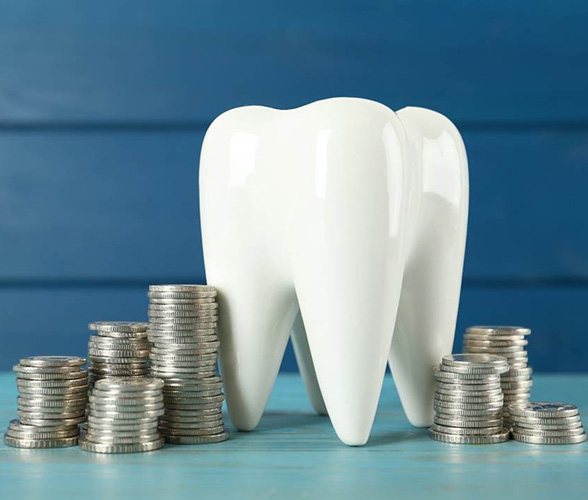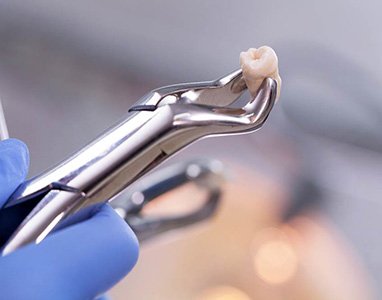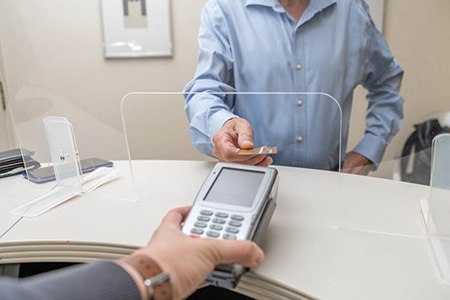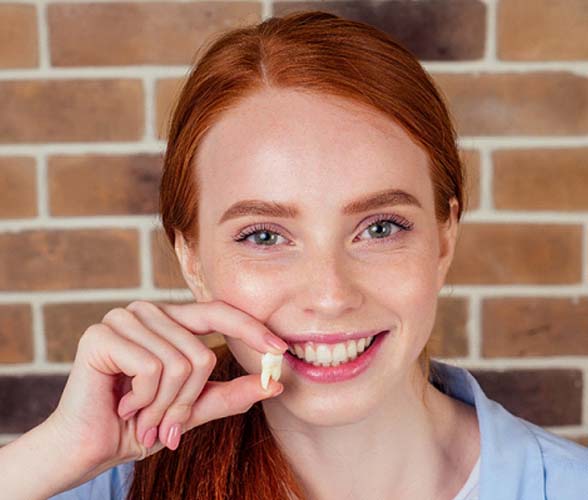Tooth Extractions – Wauwatosa, WI
Building a Healthy Foundation for Your Smile
Dentistry aims to preserve the health and beauty of your natural teeth. But in some cases, extractions are inevitable. Extraction is the removal of a tooth from its socket in the jawbone. At Wauwatosa Dental Arts, it is our priority to ensure that you are comfortable before, during, and after tooth extractions in Wauwatosa, WI. We also offer a range of tooth replacement options that can fill in any unpleasant gaps in your smile.
Why Choose Wauwatosa Dental Arts for Tooth Extractions?
- Entire Dental Implant Procedure Done In-Office
- We Offer Wisdom Tooth Extractions
- We Accept Dental Insurance
Reasons Why Tooth Extractions Are Necessary

Your dentist in Wauwatosa might determine that one or more extractions are necessary if:
- A tooth is so badly damaged that it cannot be preserved via restorative treatments, such as root canal therapy or a crown.
- You require more space in your mouth before you can begin orthodontic treatment.
- You have wisdom teeth that pose a threat to your oral health.
- Gum disease has seriously damaged the gums and bones that support a tooth.
- You are interested in getting dentures or dental implants, and your remaining natural teeth need to be removed before you can fully enjoy a new restoration.
The Process of Removing a Tooth

Extractions are generally performed under the effects of local anesthesia. The jawbone, gums, and the tooth to be extracted are numbed so that you only feel pressure but no pain while the tooth is being removed. During the procedure, we lift the tooth with a tool called an elevator. Then, we use forceps to grip the tooth and gently wiggle it out of its socket. Some teeth need to be sectioned and gently detached in parts to aid easier removal. This is generally done for teeth that have curved roots or are firmly anchored in the socket.
Either before or after your extraction, we may talk to you about your tooth replacement options, such as a bridge, dental implants, or a denture. This is an important part of your treatment because leaving a gap in your mouth for too long could adversely affect your oral health.
Tooth Extraction Aftercare

It is normal to experience some changes in your mouth after undergoing a tooth extraction. We will give you detailed instruction on post-op care. Below are some guidelines to prevent complications and promote post-procedural comfort.
- The effects of the anesthetic administered during the extraction procedure last for a few hours. During this time, take extra care to ensure that you don’t bite your lip, cheek, or tongue as it could cause injury.
- It is common for some bleeding to occur after the procedure. A gauze pack will be placed at the extraction site to control bleeding, which should be left on for about 45 minutes to let a clot form. Do not chew on the gauze.
- Avoid vigorous rinsing of the mouth or drinking with a straw as it could dislodge the blood clot and delay the healing process.
- Use a cold compress to get rid of swelling.
- If you experience vomiting, nausea, fever, severe pain, uncontrolled bleeding, or any other unusual symptoms, contact our dental office immediately.
Understanding the Cost of Tooth Extractions

Perhaps you’re worried that a tooth extraction is too pricey. Fair enough – a treatment can’t help if it greatly exceeds your budget. However, the cost of tooth extractions actually varies by patient. That means you’ll need to consult our dentists for an exact estimate. Once you have, our office will work to ensure your care is affordable. In particular, the Wauwatosa Dental Arts team will guide you on the relevant financing facts. Keep reading to learn more, or contact our office for details!
Factors That Can Affect Tooth Extraction Cost

Before treatment, our dentists will consult you and examine your tooth more closely. Doing so lets them assess factors relevant to your extraction’s cost. In general, these include the following:
- Tooth Type & Number: Truthfully, different tooth types cost more or less to extract. (For example, molars are pricier to pull than a canine.) At the same time, the number of teeth extracted also influences the treatment expense.
- Treatment Complexity: Depending on its complexity, an extraction can be simple or surgical. The former kind is typically cheaper. Meanwhile, the latter is more costly due to extra steps and tools.
- Tooth Replacement: As you’d expect, treatment will charge more if you follow an extraction with restoration work – implants, dentures, bridges, etc.
Does Dental Insurance Cover Tooth Extractions?

Fortunately, many dental plans offer coverage for tooth extractions. In particular, they’ll cover around 50% of the treatment cost if you’ve met your deductible.
All the same, remember that your dental insurance may have strong limits. Perhaps your policy only covers a certain number of teeth. Alternatively, you might have to endure a waiting period before coverage starts. As such, determine your plan’s benefits before pursuing treatment. Our office can help with that process if you’d like.
How to Make Tooth Extractions Affordable

Contrary to stereotype, insurance isn’t the only way to make tooth extractions affordable. There are several other kinds you can try! In particular, you may pursue one of your practice’s financing options. The right one would make an extraction budget-friendly for you.
For instance, just look at our own Wauwatosa Dental Arts. We happen to provide:
- Special Offers – Currently, our office is running a special offer related to extraction work. It’s a free implant consultation, which would reduce tooth replacement costs.
- Flexible Financing – Our practice provides flexible financing through CareCredit – a reputable third-party financier. With their help, you can pay for an extraction with low-interest monthly installments. (One such payment plan only requires $399/month.) That way, you could cover the cost gradually instead of all at once.
As you can see, a tooth extraction at our office doesn’t have to be expensive. That being the case, book a visit to Wauwatosa Dental Arts to have your chomper pulled.
Tooth Extractions FAQs

Even though we all wish we could keep our natural teeth for a lifetime, there are instances where removing one is the best option for your oral health. For example, factors like extensive decay or accidental injuries may lead to you needing a tooth extraction in Wauwatosa. Since the procedure can sound intimidating, it’s completely normal to have a few concerns about it. At Wauwatosa Dental Arts , we want you to feel as comfortable as possible during your extraction, which is why we’ve decided to answer some frequently asked questions below.
Does Getting a Tooth Extraction Hurt?
Many patients are hesitant to undergo tooth extraction in Wauwatosa because they’re worried the procedure will hurt. However, regardless of whether you’re getting one tooth pulled or multiple, our team will numb your mouth with a local anesthetic to ensure you’re completely comfortable. It’s worth noting that you’ll likely experience mild soreness and discomfort in the first few days following your procedure. By diligently following your aftercare instructions, you can prevent infection, reduce puffiness, and promote faster healing.
What’s the Recovery for Tooth Extractions Like?
After your extraction, you’ll receive a long list of aftercare instructions to follow during your recovery. Your foremost priority is to care for the blood clot that forms in the socket where your tooth used to be. If you fail to do so, it can result in a painful complication known as a dry socket. Additionally, you’ll want to keep your mouth as clean as possible while you heal to minimize the risk of infection. Make sure you rinse regularly with warm salt water and change the gauze as necessary. The majority of patients start feeling better about three days post-op.
Can I Smoke After Getting a Tooth Extracted?
Not immediately after your extraction! Tobacco products (i.e., cigars, cigarettes, e-cigarettes) can delay healing, which is why you should avoid smoking for at least the first five days following your procedure. If possible, it’s best to wait at least two weeks before picking up the habit again. Of course, the ideal outcome would be to quit smoking completely! Your dentist or doctor can provide you with the support, guidance, and resources you need to make the feat as easy as can be.
How Long After a Tooth Extraction Can I Get Dentures?
Typically, patients need to wait about six to eight weeks after their extraction to receive dentures. Once you’re all healed up, impressions will be taken of your mouth so the dental laboratory can create your final restoration. They’ll use the specifications they were provided with to create your replacement teeth in the ideal size, shape, and shade. After they’re made, you’ll return to the office to have your dentures placed. Our team will make any final adjustments and teach you how to properly care for your new and improved smile.
